Key takeaways:
- Open-source tools promote collaboration, transparency, and a sense of community among developers, enhancing innovation and personal growth.
- Popular open-source tools like Git, Visual Studio Code, and Docker streamline development processes and improve productivity.
- Challenges with open-source tools include documentation issues, compatibility problems, and potential security vulnerabilities that require careful consideration.
- Benefits of open-source include cost-effectiveness, flexibility in customization, and a supportive community that fosters knowledge sharing and problem-solving.
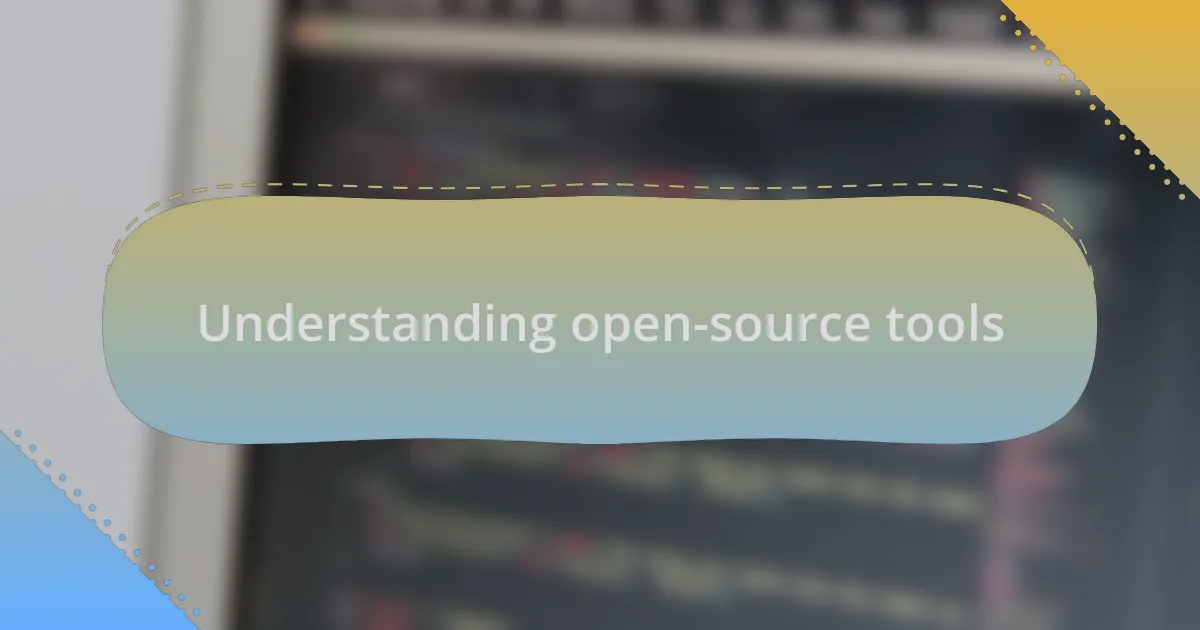
Understanding open-source tools
Open-source tools are software programs whose source code is made available to the public, allowing anyone to view, modify, and distribute it. I remember my first encounter with open-source software while looking for a free alternative to a pricey text editor. The thrill of discovering a vibrant community that had built and supported a tool completely free of cost was invigorating. It made me realize how collaborative efforts can yield incredible results.
As I delved deeper into the open-source world, I couldn’t help but appreciate the transparency it offers. When you use proprietary software, you don’t have a clear view of what’s happening ‘behind the scenes’. Have you ever wondered who decides what features get added or which bugs get fixed? Open-source projects, in contrast, foster a sense of ownership and participation that proprietary software often lacks. It’s not just about using a tool; it’s about being part of a larger conversation.
One thing that struck me was the sheer range of tools available. From web development frameworks like Django to powerful graphics editors like GIMP, the variety can be overwhelming. Yet, this diversity speaks to the creativity and innovation that thrive in the open-source community. Each tool encapsulates countless hours of effort and collaboration, and every time I use one of these tools, I feel a connection to the countless developers and users who contributed to its evolution.
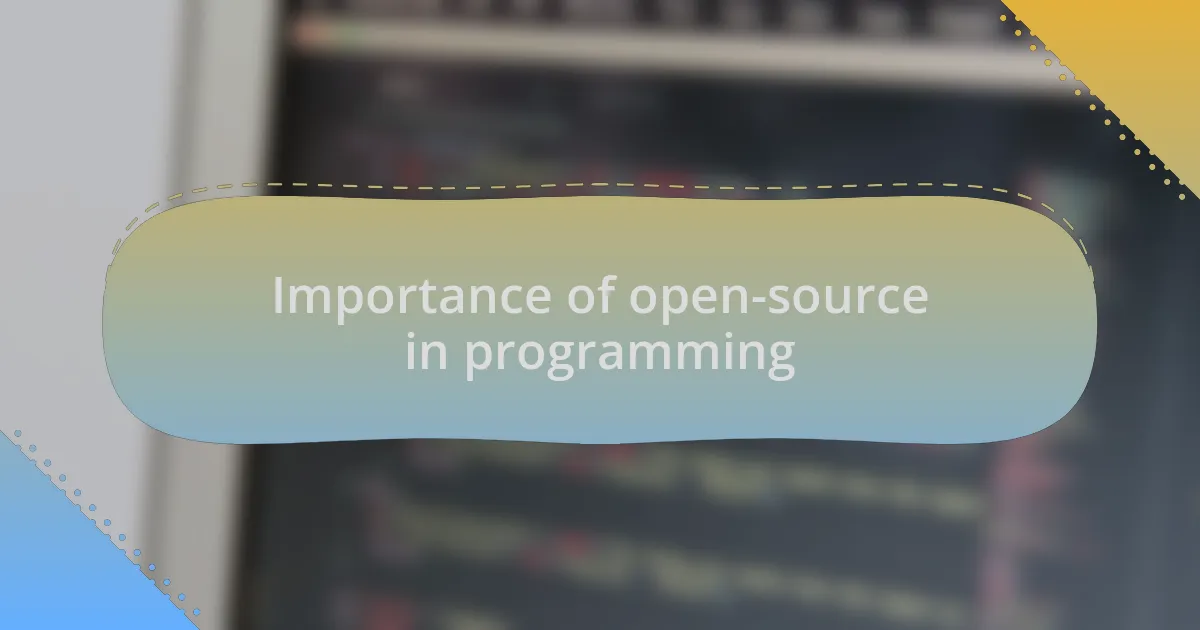
Importance of open-source in programming
Open-source software is crucial in programming because it levels the playing field for developers of all skill levels. I can’t tell you how empowering it felt to realize that anyone with a computer could contribute to projects like Linux or Mozilla. This inclusivity fosters innovation and allows ideas to flourish without the constraints often seen in commercial software development. What could be more liberating than being able to learn from and collaborate with others across the globe?
Moreover, the importance of community cannot be overstated. When I first joined a local meetup focused on an open-source project, I was struck by the camaraderie and shared passion for technology. That sense of belonging drove me to contribute, and it sparked my growth as a programmer. Isn’t it remarkable how a shared goal can unite people? The collaborative nature of open source not only results in high-quality software but also builds relationships that can last a lifetime.
Interestingly, using open-source tools has often led me down unexpected paths in my career. For instance, experimenting with a codebase taught me skills I never anticipated learning. Have you ever found a hidden passion or talent in an unexpected place? Each time I dive into open-source software, I discover new techniques, insights, and even friends, proving that the journey of programming is as much about personal growth as it is about lines of code.
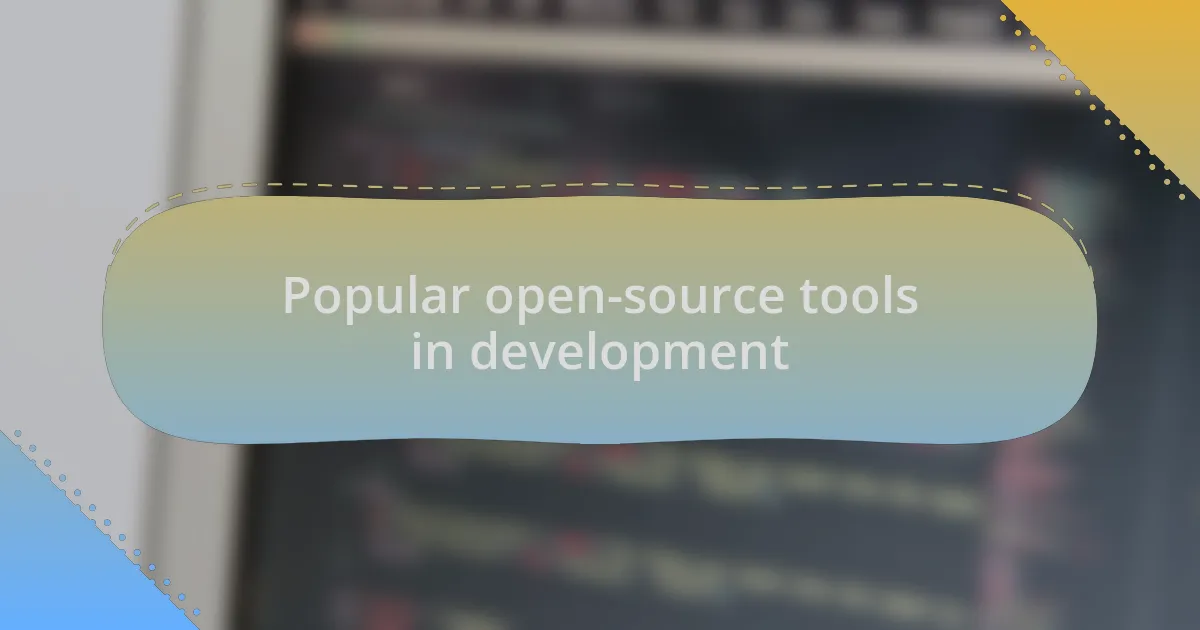
Popular open-source tools in development
When I think about popular open-source tools, one that immediately comes to mind is Git. It revolutionized the way we manage code. I recall the first time I used Git; it felt like unlocking a treasure chest of possibilities. The ability to track changes and collaborate seamlessly with others was nothing short of exhilarating. Isn’t it fascinating how a simple command-line tool can enhance teamwork exponentially?
Another notable mention is Visual Studio Code, which quickly became my go-to text editor. Its flexibility and vast extension library allow me to customize my environment based on project needs. I remember the moment I discovered a plugin that integrated my favorite database tools directly into the editor. Have you ever used a tool that just clicked for you? That moment, when everything aligns, is what makes development enjoyable.
Lastly, I can’t overlook Docker, which has transformed my approach to deploying applications. The concept of containerization opened my eyes to the power of portability and consistency across environments. I vividly recall the relief I felt when a project worked seamlessly on my machine and in production without unexpected surprises. How satisfying is it to code with confidence, knowing your environment is stable? Tools like Docker have made that a reality for me, enhancing both productivity and peace of mind.
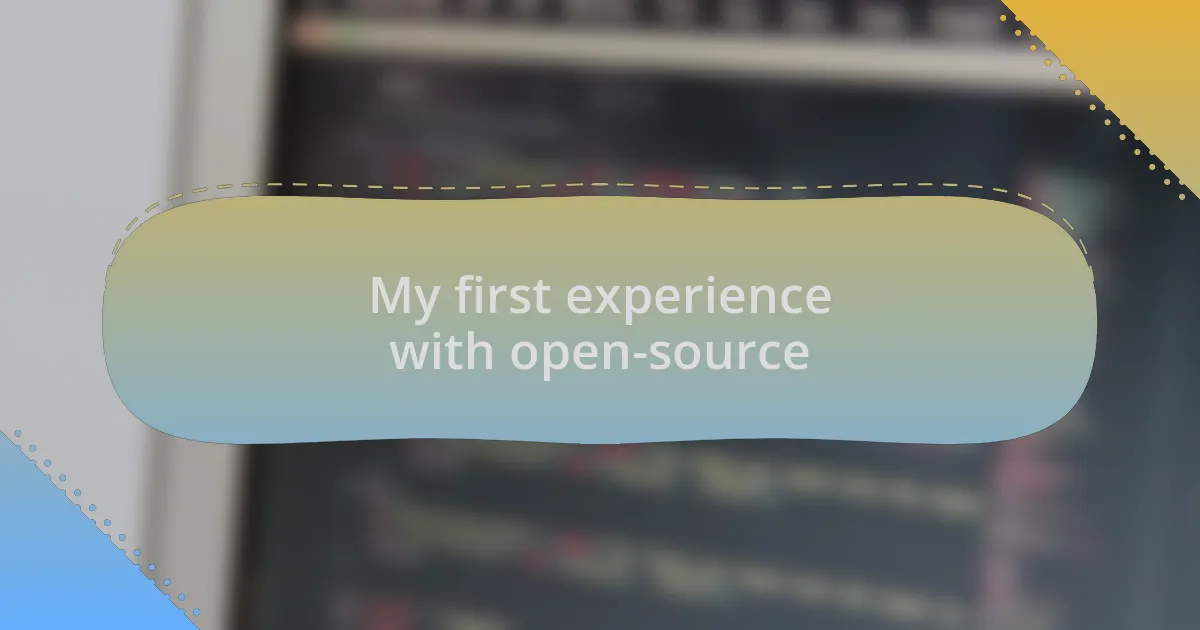
My first experience with open-source
I vividly remember my first encounter with open-source software during a college project. We were tasked with building a simple web application, and after some research, I stumbled upon WordPress. The thrill of using a platform that was not only free but also supported by a vibrant community was electrifying. I felt empowered knowing so many developers were contributing to its evolution. Have you ever experienced that rush when you realize you can modify and adapt something to fit your unique needs?
Diving into the WordPress code, I was both excited and intimidated. The sheer volume of resources available online made it easier to learn, yet I struggled at times to navigate the intricacies of PHP and CSS. I remember a specific moment when I tackled a stubborn bug—it took hours, but finally, seeing my changes reflected on the site filled me with a profound sense of accomplishment. It’s amazing how overcoming small challenges like that can ignite a passion for problem-solving.
The supportive community around open-source was another revelation for me. I found forums buzzing with helpful insights and guides that made learning feel like a collaborative adventure rather than a solitary task. It’s a comforting thought, isn’t it? Knowing that there are countless others who have navigated the same challenges and are eager to help newcomers? That initial experience not only broadened my technical skills but also fostered a sense of belonging in the tech world. Each interaction felt like building a bridge that connected me to a global community of innovators.
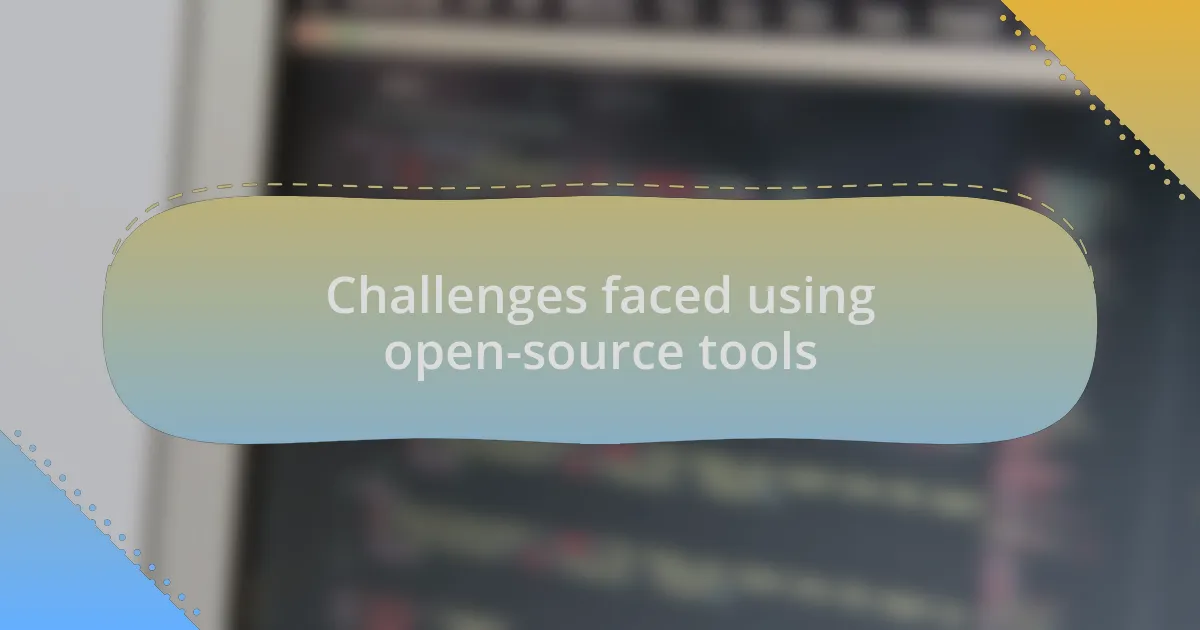
Challenges faced using open-source tools
When working with open-source tools, one glaring challenge often surfaces: documentation. I can’t tell you how many times I found myself scratching my head over incomplete or outdated guides. It can feel frustrating, especially when you’re trying to implement a feature that seems simple in theory but becomes a murky puzzle in practice. Have you ever felt lost digging through a maze of documentation? It certainly makes you appreciate the clarity that well-maintained resources provide.
Another hurdle I faced was compatibility issues. I remember attempting to integrate a plugin into my project, only to discover it clashed with other tools I had installed. It was like trying to fit a square peg in a round hole! These technical snags can not only drain your time but also dampen your enthusiasm. It often left me questioning whether investing effort into open-source was worth the occasional headache.
Lastly, there’s the matter of security. While open-source software is generally considered safe, vulnerabilities can lurk, sometimes hidden beneath layers of community trust. I learned this the hard way when a project I relied upon was flagged for a significant security flaw. It made me realize the importance of regular updates and staying informed about potential threats. How often do we pause to consider the security implications of the tools we use? It definitely adds a layer of responsibility to our programming journey.
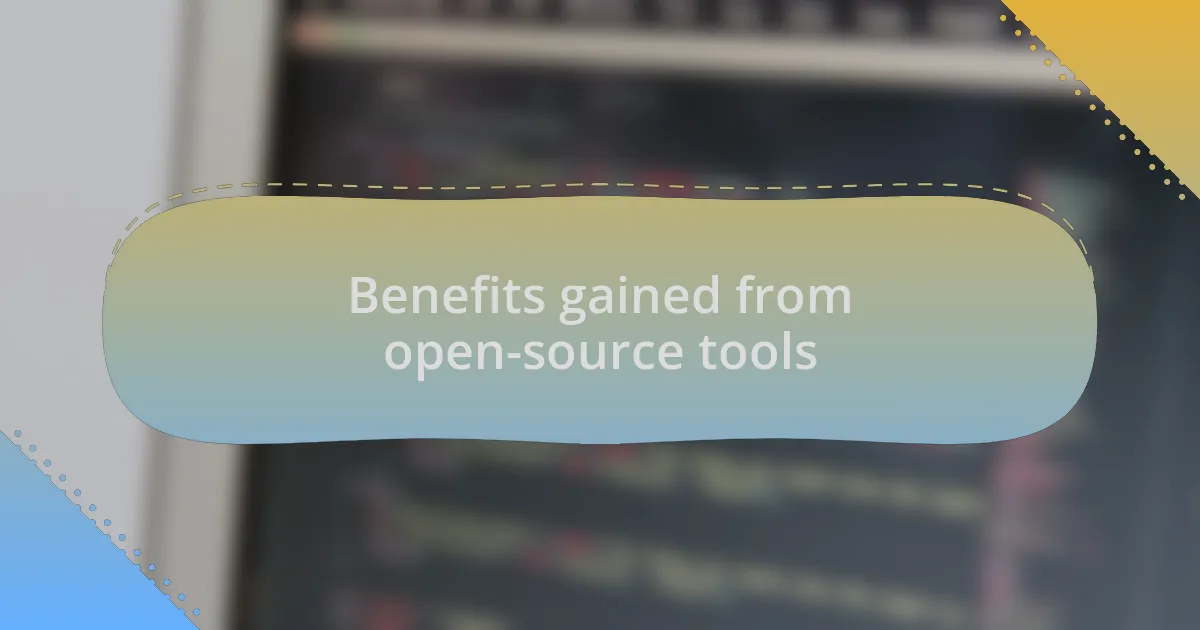
Benefits gained from open-source tools
One of the most rewarding aspects of using open-source tools is the sense of community they foster. I remember joining a forum while troubleshooting a particularly stubborn issue, and I was blown away by the support I received. It felt like being part of a club where everyone shares knowledge. Have you ever found yourself in a situation where a stranger’s advice solved your problem? That shared enthusiasm and collaborative spirit is a huge plus for me.
Beyond community, I appreciate the cost-effectiveness of open-source tools. When I was starting out in programming, I had limited resources. Being able to access high-quality software without hefty licensing fees made all the difference. Have you ever faced budget constraints that made you rethink your tool choices? I certainly have, and it’s a relief to know that powerful solutions are often just a download away.
Another significant benefit is the flexibility that open-source tools provide. I recall customizing a project to fit my specific needs without having to wait for vendor approval. It was liberating! This adaptability has saved me countless hours by allowing me to modify tools to exactly what I envision. How often do you wish your tools could just do exactly what you want? With open-source, that’s often a very achievable goal.